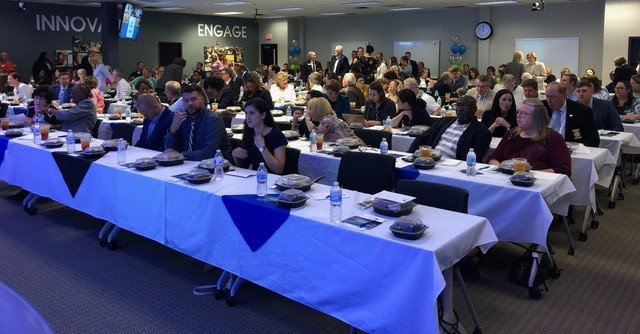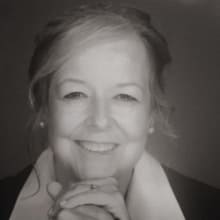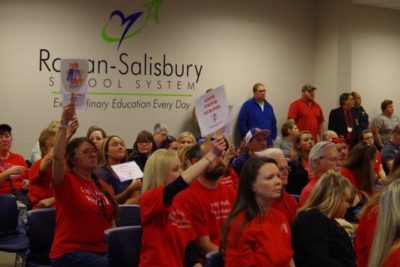

Rowan-Salisbury Schools (RSS) hosted a dinner Thursday night for school board and community members to learn about performance-based learning from the folks who invented it: Lindsay Unified District in California. The dinner was attended by school board members and their spouses, community members, and staff.
Tom Rooney, superintendent at Lindsay, and Barry Sommer, the director of advancement there, traveled to Salisbury to hold an informal discussion on Thursday and to train principals and lead teachers on Friday. Representatives from other North Carolina districts traveled to Salisbury on Friday to observe the training.
Among the community members were philanthropists Fred and Alice Stanback; local banker Nick Means; Jason Walser, executive director of the Robertson Foundation; Greg Alcorn and wife Missy, founders of the Apseed Foundation; and Glenn Weatherby, chair of Rowan Partners for Education.
Rooney started the presentation by sharing statistics from Lindsay Unified District. There are 4,000 students in the district. For comparison, RSS has about 20,000. Lindsay experienced multiple decades as a failing district. The county was ranked in the bottom 10% of California, and Lindsay was the lowest district in the county. Gang involvement was high. The district had the highest teen pregnancy rate and the lowest graduation rate in the state. The community is 90% Latino, and 53% of students come to school with no English skills. The average education rate in the community was fifth grade. It is a community of farm owners and farm workers.
“If you eat stone fruit — peaches, plums, apricots — or nuts, almonds or walnuts, it’s likely they came from our county,” Sommer said. “Our learners’ parents leave to pick fruit before daybreak and return home well after dark.”
“We were failing our children,” Rooney said. “For us, it was a moral imperative to build a different future for our children.”
“We were in significant pain,” Sommer said. “Our kids weren’t learning. They were dropping out. We had a pipeline to prison. Today, though, we are supporting districts like RSS who want to advance the work.”
Rooney and Sommer explained that people learn in different ways and on different time frames. When a student repeats a grade, it is unlikely he or she failed to comprehend the entire year of information, but more likely that there were specific gaps in understanding. Performance-based learning allows students to remain with a given subject until he or she has mastered the required elements before moving to the next level, rather than repeating an entire year of instruction.
“The traditional model does not honor that belief,” Rooney said.
Because of this failing system, Lindsay set out 12 years ago to develop a “new vision” for students. They modeled a system where students know exactly they are learning, why they are learning it, how they will be assessed on understanding, and how it fits into the larger picture. “Even kindergartners,” smiled Rooney.
Students continue learning a skill until they master it. For some, that’s quick. For others, that’s slow. For this reason, there’s really no such thing as a “grade level.” Students may be ahead or behind — or both, depending on the subject.
Rooney said that he first explained the concept to eighth graders about to enter high school.
“Some of you will not graduate in four years,” he explained. “Some may graduate more quickly; some more slowly.”
Reactions were negative until a lone hand went up in the back of the room.
“I see it differently,” said a tall boy. “It means you’re not giving up on us. All my life, they’ve passed me on to the next grade even though they know I can’t read. You could almost see the relief on my teacher’s face when I left. But you’re not giving up on me. You’re going to let me keep learning until I ‘get it.’”
Rooney says he loves to tell the story because, in fact, that’s the case.
He said that one of the pieces of Lindsay’s journey was the investment others made. The only personalized learning at that time was a small district in Alaska with 137 students. They started working with their students of poverty with little or no support at home, and the students began to see their possibilities.
An article about Lindsay in the Wall Street Journal in 2014 opened doors when the Gates Foundation came to call. Then, the Chan Zuckerberg Initiative was interested. They also received significant help from the federal government, the Carnegie Foundation, and others.
Today, 12 years later, the district is improving.
Lindsay is still in the top 10 districts for teenage pregnancy in California, but they are now ninth rather than first. They’re down to 2% gang affiliation. That 67% graduation rate now stands at 94%. Most importantly, Rooney says, students are graduating with the skills and knowledge they need to enter the adult world.
Questions from the community included one about teacher retention in such a challenging populace. Rooney said he now has freshly graduated teachers returning home to teach in Lindsay. He also has a program to incentivize non-certified staff to become teachers and stay in the district. And, thanks to all the publicity Lindsay has enjoyed, teachers are calling to ask if they can teach in the competency-based district.
Sommer said they have inspired and motivated their students to attend school so that students now want to come. They don’t like weekends because they’re not in school.
Like RSS, Lindsay focuses on personal skills with their students in an intentional way.
Three RSS schools have included plans to pilot competency-based learning into their curricula as part of renewal. The RSS school board has traveled to Lindsay to observe classes and to talk to students about their experience in the district.
“I’ve been very encouraged in my interactions with Lynn (Moody) and staff,” Rooney said, in reference to the superintendent of RSS. “You are about the learner, doing the hard work. Hard work is so rewarding when your learner is the focus.”


